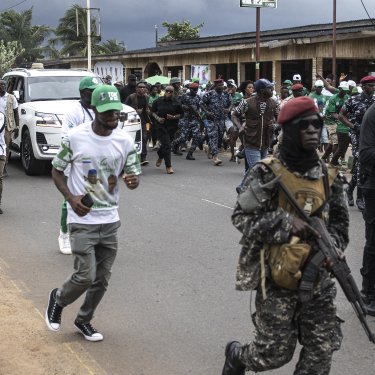Sierra Leone must protect journalists, not cut Internet during elections

Reporters Without Borders (RSF) calls on Sierra Leone’s authorities to ensure that journalists are able to cover this weekend’s general elections without fear of reprisals and without any Internet cuts.
The country’s media must be able to cover the presidential, parliamentary and municipal elections on 24 June without having to worry about the safety of their reporters or the possibility of major online dissemination problems.
Journalists, civil society representatives and human rights defenders have all expressed concern about a possible repetition of the Internet cuts that occurred during violent anti-government protests in August 2022 and during the Covid-19 pandemic.
RSF was part of a coalition of 44 organisations that published an open letter on 16 June calling on the government to “ensure that the internet, social media platforms, and all other communication channels remain free, open, secure, inclusive and accessible prior to, during, and after the general election.”
Recent serious press freedom violations have also fuelled fear of renewed violence during the elections. BBC correspondent Umaru Fofana was harassed and threatened by supporters of the opposition All Peoples Congress (APC) while covering an APC event on 14 June. It was only because several persons, including another journalist, intervened that he avoided being subjected to physical violence.
Radio Fountain of Peace journalist Alie Melvin Tokowa was physically attacked by seven supporters of a local representative of the ruling Sierra Leone People’s Party (SLPP) while covering an event on 28 March in Moyamba, a town 160 km east of the capital, Freetown. Tokowa told RSF his assailants beat him for about 15 minutes until he “lost consciousness” and that he had to be transported to a hospital in Freetown. He “still had pains until mid-April,” he added.
We condemn the attacks on journalists and call on the authorities to identify those responsible and bring them to justice. Political actors of all parties must respect the work of journalists, especially during these important moments in the nation’s democratic life. Authorities must also ensure that access to the Internet and digital platforms, which facilitate journalists’ coverage of the elections, is not blocked.
Elected in 2018, President Julius Maada Bio is seeking another five-year term as president in this weekend’s elections. The parliament’s 135 seats and 493 municipal council seats are also up for election.
During his first term as president, Bio decriminalised press offences and created an Independent Media Commission to regulate the mass media and manage the allocation of broadcast frequencies.
RSF believes that whoever is elected this weekend should quickly address the economic challenges facing the media, which limit their ability to produce content that is useful to the public. They should also promote and protect the media’s freedom, viability and sustainability, ensure the safety of journalists, advance gender equality and help to empower women journalists and build their capacity.
Sierra Leone is ranked 74th out of 180 countries in RSF's 2023 World Press Freedom Index.
- Africa
- Sierra Leone
- Technological censorship and surveillance
- Digital space and democracy
- Independence and pluralism
- Models and good practices
- Violence against journalists
- News
- Advocacy
- President
- Correspondent (Local / Foreign correspondent)
- Press freedom
- Freedom of opinion and expression
- Right to news and information
- Democracy
- Digital arena
- Politics
